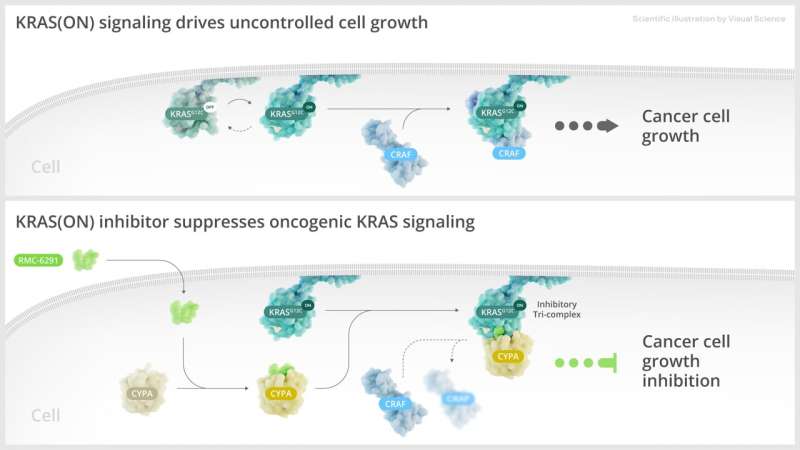August 21, 2023 report
This article has been reviewed according to Science X's editorial process and policies. Editors have highlighted the following attributes while ensuring the content's credibility:
fact-checked
peer-reviewed publication
trusted source
proofread
A KRAS solution method overcomes the undruggable obstacle

Research conducted by Revolution Medicines, California, and Memorial Sloan Kettering Cancer, New York, has developed a method to bypass the undruggable nature of a common oncogene mutation that drives cancer development and resistance to existing therapies.
In a paper, "Chemical remodeling of a cellular chaperone to target the active state of mutant KRAS," published in Science, the team introduces a novel approach for targeting active mutant KRAS, addressing the "undruggable" challenge. A Perspective published in the same journal discusses the team's findings.
KRAS is a notorious cell signaling gene frequently implicated in various cancers, pivotal in driving uncontrolled cell growth and proliferation. KRAS mutations are present in about 25% of tumors and are the driver mutation behind 32% of lung cancers, 40% of colorectal cancers, and 85% of pancreatic cancer cases. KRAS is the most frequently mutated oncogene in humans.
With such an involved role in many cancers, KRAS should be a prime target for therapeutic intervention. The lack of suitable drug-binding sites on the KRAS protein has posed a significant obstacle in developing effective drug treatments, leading to the label "undruggable" being associated with it. Labels like untreatable, undruggable and unknown cause have an increasingly shorter shelf life in modern science.
The team crafted a small molecule, RMC-6291, with a precision-targeted neomorphic binding interface. Researchers strategically engineered RMC-6291 to form a tri-complex with CYPA, a natural cellular chaperone, and a single-point mutation on the KRAS protein. With RMC-6291 at the intersection, the interactions are disrupted, shutting down the signaling pathways driven by KRAS.
Beyond its applicability to the single-point mutation in KRAS, the study highlights the potential this approach strategy has to be extended to other challenging targets. This opens up the possibility of addressing a broader range of oncogenes previously considered beyond the reach of drug development.
As with any novel find or innovative method, more research is needed. A phase 1/1B clinical trial testing RMC-6291 (NCT05462717) is currently underway.
More information: Christopher J. Schulze et al, Chemical remodeling of a cellular chaperone to target the active state of mutant KRAS, Science (2023). DOI: 10.1126/science.adg9652. www.science.org/doi/10.1126/science.adg9652
Jun O. Liu, Targeting cancer with molecular glues, Science (2023). DOI: 10.1126/science.adj1001
© 2023 Science X Network



















